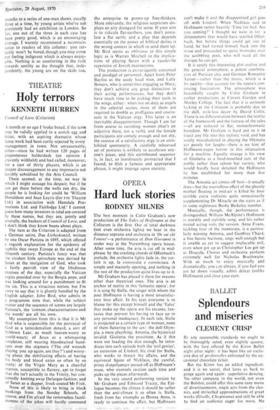OPERA
Hard luck stories
RODNEY MILNES
The best moment in Colin Graham's new production of The Tales of Hoffmann at the Coliseum is the first. Out of total darkness (not even orchestra lights) we hear in the distance soprano and orchestra in 'Or sal chi l'onore'—a performance of Don Giovanni is under way at the Nuremburg opera house. After some time, the aria is cut off in mid- phrase by the crashing chords of Offenbach's prelude, the orchestra lights fade in, the cur- tain is up, la commedia e cominciaia. A simple and masterly opening, and nothing in the rest of the production quite lives up to it.
Mr Graham has placed it there for reasons other than theatrical ones. The aria is an anchor of reality in this 'fantastic opera', for it is sung by Stella. the singer with whom the poet Hoffmann is having a most unsatisfac- tory love affair. In his eyes everyone is to blame for this except himself and the 'Tales' that make up the opera are his excuses, fan- tasies that prevent his having to face up to any personal inadequacy. In each tale, Stella is projected as a certain type of woman, none of them flattering to the sex: the doll Olym- pia, a mere plaything; Antonia, the hysterical invalid; Giulietta the prostitute. As if this were not loading the dice enough, he intro- duces into each episode both the 'evil genius', an extension of Lindorf, his rival for Stella, who works to thwart the affairs, and the equivocal figure of Nicklaus, the careful, prissy doppelganger passed off as Hoffmann's muse, who counsels caution each time and picks up the pieces afterwards.
In the very sound performing version by Mr Graham and Edmund Tracey, the Epi- logue becomes the climax it should be rather than the anti-climax it so often is. Stella, fresh from he; triumphs as Donna Anna, is ready to continue the affair, but Hoffmann
can't make it and the disappointed girl goes off with Lindorf. When Nicklaus said to Hoffmann rather heartily 'Time for bed. Are you coming?' I thought we were in for, a denouement that would have startled Offen- bach, but before things could get out of hand, he had turned himself back into the muse and praxeded to spout bromides over the scribbling poet, who will need all the therapy he can get.
It is surely this interesting plot outline and the general atmosphere, a potent combina- tion of Parisian chic and German Romantic Terror—rather than the music, which is a bit patchy—that account for the opera's con- tinuing fascination. The atmosphere was beautifully caught by Colin Graham in earlier productions at Covent Garden and Morley College. The fact that it is seriously lacking at the Coliseum is probably due to the dull, style-less decor by David Collis. There is no differentiation between the reality of the framework and the fantasy of the tales —all are reduced to flat, monochromatic boredom. Mr Graham is hard put to it to inject any life into this stylistic void, and has surely miscalculated in playing the Olympia act purely for laughs—there is no hint of Hoffmann-esque horror in this infatuation for a machine. Equally strange is his view of Giulietta as a loud-mouthed tart, of the public rather than saloon bar variety, who would hardly have detained the Hoffmann he has established for more than five m 'flutes.
The Antonia act comes off best—it usually does—but the marvellous effect of the ghostly mother floating in mid-air is killed by four terrible extra violinists quite unnecessarily supplementing Dr Miracle on the stairs as if in some nightmare Busby Berkeley number.
Musically, though, the performance is distinguished. William McAlpine's Hoffmann is sturdily and stylishly sung, and his rather muted acting suits the version. Anne Evans, tackling four of the inamorata, is a particu- larly winning Antonia, and Geoffrey Chard. a fine heroic baritone, sings well enough but is unable as yet to suggest implacable evil. even when got up as Christopher Lee got up as Dracula. Chorus and orchestra perform extremely well for Nicholas Braithwaite. With so much to enjoy musically and dramatically, you can always, if you feel you are let down visually, admit defeat (unlike Hoffmann) and close your eyes.






























 Previous page
Previous page